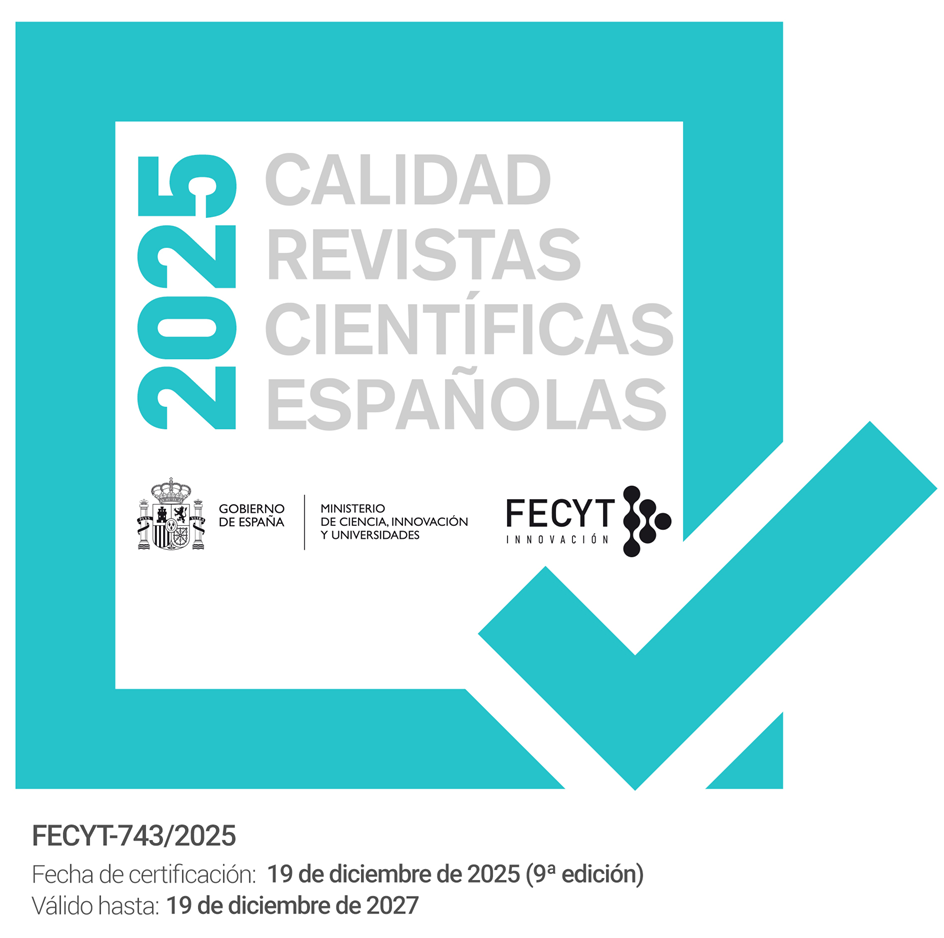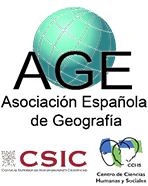Indexing

GeoFocus (ISSN:1578-5157) is an international scientific and technical journal which focuses on Geographical Information Science and Technology and its different applications. In particular, it accepts contributions in the following areas of interest:
Contents are organized into several sections: editorial, original papers of theoretical or practical research, which constitute the main body of the magazine, short subjects (reflections, descriptions, etc., of a maximum length of 2 pages, on technical and professional applications or studies), reviews (of books, maps, data sets and Geographical Information Science software, etc.) and summaries of doctoral theses.
All contributions must be original and are subjected to a process of external and anonymous evaluation. This evaluation is performed by specialists from the international scientific community. The Editorial Board assists the Director and Associate Editors to an optimal selection process. In addition, an International Advisory Board establishes the strategic framework of the magazine and supervises the running and results annually.
GeoFocus has been continuously published since 2001 in an electronic format, and it is open to contributions from the international scientific community, being a reference publication in the theory, methods, developments and applications of the discipline. Two annual issues are published and the official publication languages are Spanish, Portuguese and English.
The journal is indexed and is present in summaries in a large number of databases, directories, portals and national and international scientific repositories (see Indexed, impact and GeoFocus recognition). Since its beginning, GeoFocus is an open access journal and there are no publication fees; through the upper menu you can access the full text of the magazine in PDF format (sections Current Issue and Archives).
GeoFocus is the Journal of the Geographical Information Technologies Working Group of the Spanish Geographical Association. It receives institutional and technical support from RedIRIS (Spanish Academic and Research Network funded by the Ministry of Economy and Competitiveness), FECYT (the Spanish Foundation for Science and Technology) and Grumets (Methods and Applications in Remote Sensing and Geographic Information Systems Research Group).
Additional details about Originality, Language, Peer Review Process, Code of conduct / Ethics, Publication Frequency, Open Access Policy, Archiving, Indexing and Ownership and management are provided in the following sections.
GeoFocus publishes original research papers that have not been published before and are not in the process of evaluation or publication in any other journal or publication.
Papers can be submitted in Spanish, English and Portuguese.
1. The original research papers follow an anonymous peer review process, double-blind method, by at least two specialists from the national and international scientific communities, proposed and coordinated by the Editorial Board. This process seeks to ensure the scientific and technical quality of the contents.
2. GeoFocus is an open access journal without publishing costs. These characteristics, obviously advantageous for authors, can only be sustainable through a total responsibility by them regarding the formal quality of the originals. Consequently, articles that are submitted with formatting errors and / or a presentation non-compliant with the guidelines of the journal or showing evident orthographic and / or syntactical mistakes will not pass to the review phase.
3. When receiving a paper meeting all the formal requirements, this will be acknowledged and the evaluation process will start.
4. In a first phase, editors make a general review of the quality and adequacy of thematic work. Those works whose quality is notably low or not matching the journal areas of interest can be rejected directly without starting an external evaluation. At this first review, editors may require the assistance of the members of the Editorial Board.
5. Works passing this first review will be sent to two specialists in the field of research. In those cases where reviewer recommendations differ substantially, or for any other necessary reason, the text may be sent to a third evaluator.
6. According to the reports of the evaluators, publishers may select one of the following decisions, which will be communicated to the corresponding author:
a) Submission Accepted (or with minor modifications).
b) Revisions Required. In this case, the author will address all changes recommended by the reviewers and/or editors. The deadline for such changes is one month, and authors must attach a brief report explaining the changes and how they conform to the recommendations of the editors and / or evaluators.
c) Resubmit for review. Rewrite and resubmit the paper after a thorough review. In this case, forwarding a new version does not imply any guarantee of publication, but the evaluation process will start from the beginning.
d) Submission declined.
7. When a work is accepted for publication, the printing proof must be reviewed by the author within a maximum of one week.
8. GeoFocus publishes every two years a list of all people who have made anonymous evaluations.
9. GeoFocus may publicly report, when necessary, the following bad scientific practices: plagiarism, falsification or invention of data, individual appropriation of collective authorship and duplicate publication.
10. The Editors and the Editorial Board have agreed to add GeoFocus to the UNESCO recommendations regarding non-sexist language, and recommend the authors take this into account.
GeoFocus follows the Code of Conduct and the Best Practices Guidelines for Journals Editors of the Committee on Publication Ethics., as well as to the Sex and Gender Equity in Research (SAGER) Guidelines.
You can also read our Guide to good practices and ethical commitment for the publication of articles.
Two issues per year are published.
This is an open access journal, based on the principle that providing free access to research helps to achieve a greater global exchange of knowledge. Publishing in GeoFocus is free of charge, as well as accessing its contents.
All articles are published under a license CC BY-NC-ND 4.0.
By means of the backup systems of the Universitat Autònoma de Barcelona, GeoFocus guarantees electronic backup and preservation of access to the journal content in the event the journal is no longer published.
You can check this information at this link.
Number of articles received: 34 per year
Acceptance rate: 51%
Assistance in Writing, Data Analysis, and Modelling
AI tools may be employed to improve language clarity, correct grammar, and enhance text fluency, as well as to support literature review and the preparation of article summaries. In all cases, the information generated must be accurate, supported by verifiable sources, and reviewed by the authors (who must always be human in GeoFocus — see below). AI may also be integrated into data analysis and modelling, provided that this process is thoroughly described in the methodology section and the reliability and traceability of the resulting data are ensured.
Autonomous Generation of Scientific Content
AI must not be used to generate hypotheses, interpret data, or formulate conclusions without the supervision and validation of the human authors of the article.
Responsibility and Authorship of the Article
AI cannot be listed as an author or co-author of any article.
Declaration of AI Use
If AI tools have been used for text generation, translation, image editing, data analysis, or any other phase of the work, authors must explicitly mention this in the article.
Use of AI in the Review and Editorial Process
Editors and reviewers must disclose to the authors and other editorial collaborators any use of AI tools during their tasks.
To ensure the privacy of research data and peer review processes, all parties should be aware that most AI tools retain the instructions and data submitted to them. Therefore, submitting the content of a manuscript to an AI tool constitutes a breach of confidentiality.
Ethical Considerations
The use of AI must adhere to the principles of transparency, integrity, and scientific rigor. The use of AI tools for data fabrication or manipulation, or for the generation of content that cannot be verified, is considered unacceptable.
Failure to disclose the use of AI tools in the article will be regarded as a breach of academic ethics and may result in the rejection of the submission or the withdrawal of an already published article.
Review and Update of this Policy
Given the rapid development of AI technologies, this policy will be subject to periodic review to ensure its compliance with current ethical standards in scientific communication.
GeoFocus is the Journal of the Geographical Information Technologies Working Group of the Spanish Geographical Association. It receives institutional and technical support from RedIRIS (Spanish Academic and Research Network funded by the Ministry of Economy and Competitiveness), from FECYT (the Spanish Foundation for Science and Technology) and from Grumets (Methods and Applications in Remote Sensing and Geographic Information Systems Research Group), Universitat Autònoma de Barcelona.
|
The contents of this journal are protected under Attribution-NonCommercial-NoDerivatives 4.0 International (CC BY-NC-ND 4.0) license. |
 |
 |
GeoFocus is the Journal of the Geographical Information Technologies Working Group of the Spanish Geographical Association. It receives institutional and technical support from RedIRIS (Spanish Academic and Research Network funded by the Ministry of Economy and Competitiveness), FECYT (the Spanish Foundation for Science and Technology) and Grumets (Methods and Applications in Remote Sensing and Geographic Information Systems Research Group).
